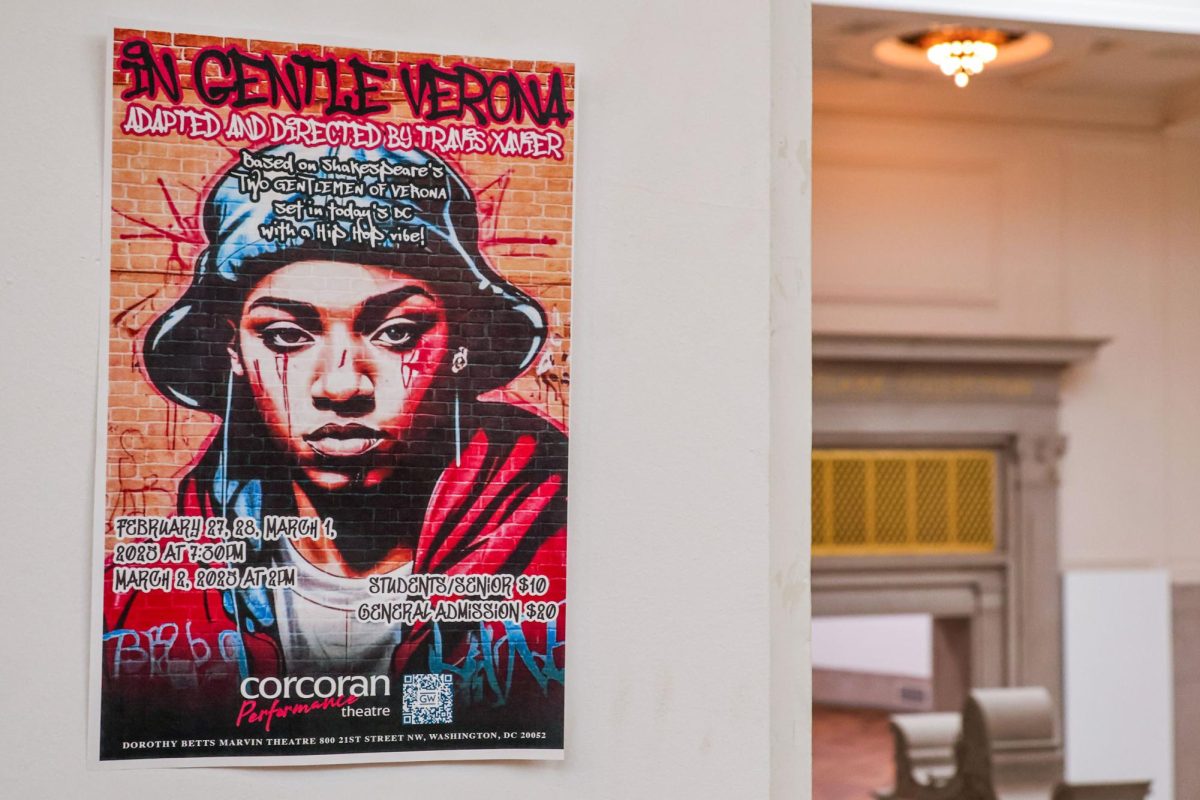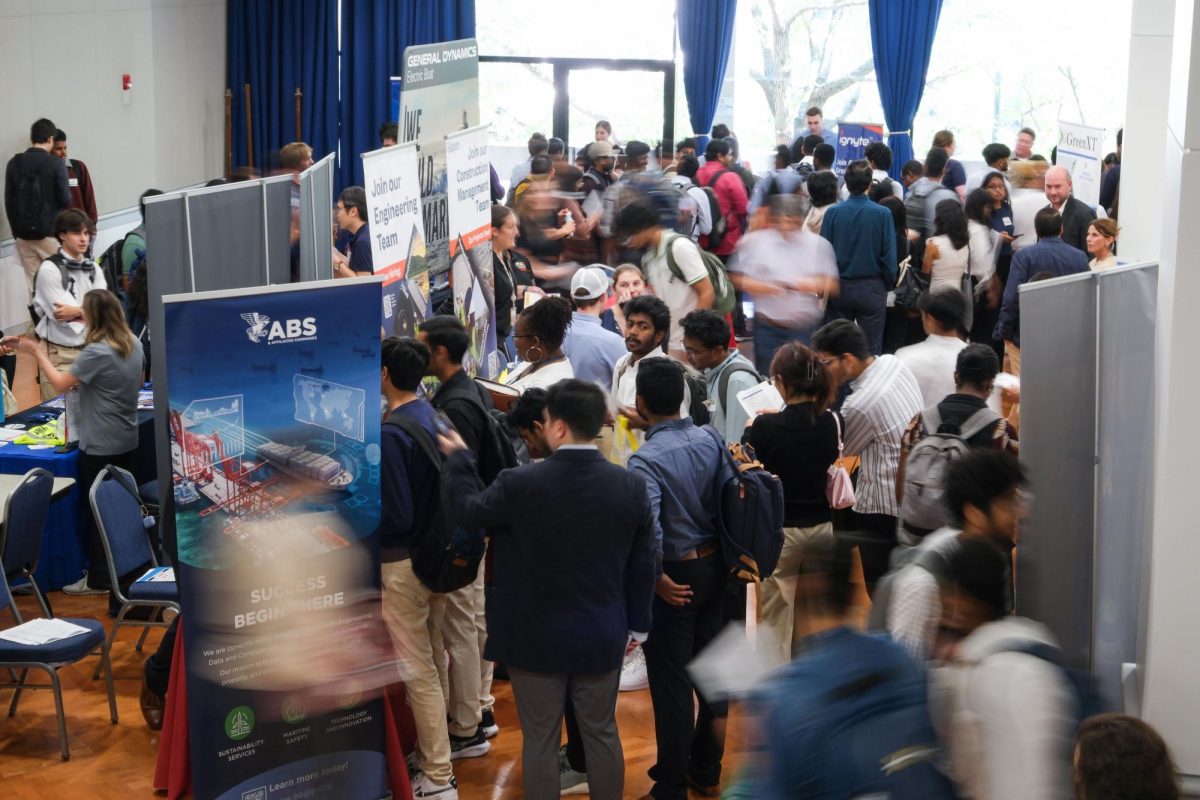Students criticized the Corcoran Program of Theatre & Dance’s use of artificial intelligence to design posters for student stage productions in a petition last month, accusing the school of undermining their artistic abilities.
The petition, which has 110 signatures as of Thursday, states that GW used AI to generate promotional posters for Corcoran Program of Theatre & Dance student productions “The Book of Everything” and “In Gentle Verona,” and demands the program offer more creative opportunities for students to apply their artistic skills in a professional setting. Corcoran School of the Arts & Design Director Lauren Onkey said the posters were designed using “open AI tools” in part to “learn the possibilities of new technologies,” a decision that she called a “misstep.”
The “In Gentle Verona” poster depicts a brick wall with a mural detailed with graffiti and a girl wearing a hoodie and cap. “The Book of Everything” poster shows a frog fixed with a raincoat, perched over a book under an umbrella, framed by blurred city buildings that fade into the background.
CTAD students said the University’s use of generative AI to create the posters denies students opportunities to develop their design portfolios with professional experience.
“If this is a pattern, I can’t just sit back and let it happen,” senior Emma Taylor, an international affairs student who wrote and posted the petition on Feb. 20, said. “I know people in the art school, to give them an opportunity to showcase their work is invaluable.”
The petition lists numerous details regarding the posters’ design and content that point to the use of generative AI. Taylor said examples include “logical fallacies” where details don’t add up, like the lack of clarity of what the white lines are supposed to depict in the “In Gentle Verona” poster, and text that reads as “gibberish.”
She added that texture is an indicator in AI-generated art, like in the poster for “The Book of Everything,” where the frog lacks a “sticky” look and the raindrops are all circles of similar size.
“There’s too many inconsistencies there that a human wouldn’t make,” Taylor said.
She said the “In Gentle Verona” poster also includes a generalized representation of a Black woman instead of portraying the actual lead performer in the show.
“It’s this generic *ss, kind of like looking off to the side, no real facial expression, smooth face, no blemishes, no general discernible features Black woman,” Taylor said.
Taylor added that GW’s use of AI despite policing students’ usage in classes is “hypocritical” because it is not adhering to its own guidelines. GW’s Generative AI Guidelines permit the use of AI when cited as a tool for developing ideas but prohibit the submission of work that uses generative AI, in part or in whole, to be passed off as one’s own intellectual product.
Onkey, the Corcoran director, said concerns about the posters “were not brought directly” to the Corcoran Theatre & Dance Program or to her, but that she, faculty and Corcoran program heads welcome their perspectives.
“We are committed to holding ourselves to the same standards we expect of our students and are reviewing our internal processes to ensure future promotional materials for Corcoran events are created in alignment with those standards,” Onkey said in an email.
She said Corcoran leaders “regularly engage” student designers in the creation of materials for the school’s exhibitions, including the annual NEXT Festival, which exhibits Corcoran student’s thesis work.
“We look forward to using this moment as an opportunity to think broadly about how students can contribute to our visual communications,” Onkey said in an email.
Tye DuSold-O’Connor, a sophomore studying studio arts and psychology who signed the petition, said using AI to make posters goes against GW’s own guidelines and creates an idea that the Corcoran’s own student body isn’t good enough to promote its own shows.
“This is a school literally teaching us how to become artists, but doesn’t want to invest in our work,” DuSold-O’Connor said. “How do you expect us to feel like the world will invest in our work if our school doesn’t even invest in our work?”
DuSold-O’Connor said they hope the petition encourages Corcoran to reach out to students to create posters in the future.
“The whole point of art is it’s human and up to a human’s decision and flaws,” DuSold-O’Connor said. “AI creates this guise that aesthetics matter more than the person making it.”
Senior Ali Lightfield, a performer in “In Gentle Verona” who signed the petition, said she felt “embarrassed” promoting the poster for “In Gentle Verona” on her social media because she is morally opposed to the use of AI in the arts. Using AI as a substitute for human artwork diminishes the talent of the people in the field, takes away jobs and creates a very “surface-level” effect, she said.
She said she only began promoting the show on social media in the final week leading up to opening night once CTAD had posted photos of the cast and show to Instagram. The AI-generated poster does not reflect the actual work the people behind the show have put in and felt like the “laziest option” to market the show, she said.
“The Corcoran school of Theatre and Dance, and even just the Corcoran school in general, has so many creative people at their disposal, including very talented artists who could have made this poster,” Lightfield said. “It’s really disappointing to see, of all the schools at GW, the artistic one using AI.”








